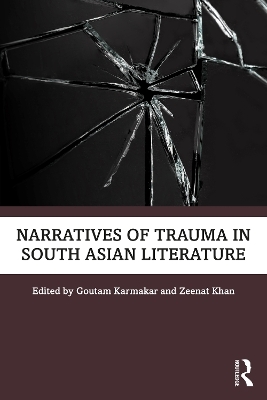
Narratives of Trauma in South Asian Literature
Routledge India (Verlag)
978-1-032-40535-3 (ISBN)
This volume addresses cultural and literary narratives of trauma in South Asian literature. Presenting a novel cross-cultural perspective on trauma theory, the essays within this volume study the divergent cultural responses to trauma and violence in various parts of South Asia, including Sri Lanka, Bangladesh, Nepal, and Afghanistan, which have received little attention in literary writings on trauma in their specific circumstances. Through comprehensive sociocultural understanding of the region, this book creates an approachable space where trauma engages with themes like racial identity, ethnicity, nationality, religious dogma, and cultural environment.
With case studies from Kashmir, the 1971 liberation war of Bangladesh, and armed conflict in Nepal and Afghanistan, the volume will be of interest to scholars, students and researchers of literature, history, politics, conflict studies, and South Asian studies.
Goutam Karmakar, Ph.D. (English), is an NRF Postdoctoral Fellow at the University of the Western Cape, South Africa. He is also Assistant Professor of English at Barabazar Bikram Tudu Memorial College, Sidho-Kanho-Birsha University, Purulia, West Bengal, India. He is the lead editor of Routledge book series on South Asian literature. His forthcoming and recently published edited volumes are Nation and Narration: Hindi Cinema and the Making and Remaking of National Consciousness (forthcoming); The Poetry of Jibanananda Das: Aesthetics, Poetics, and Narratives (forthcoming); The City Speaks: Urban Spaces in Indian Literature (2022); and Religion in South Asian Anglophone Literature: Traversing Resistance, Margins and Extremism (Routledge, 2021). His areas of interest are Women and Gender Studies, South Asian Literature, Postcolonial Studies, and Ecological Studies. He has been published in journals including Visual Anthropology, Quarterly Review of Film and Video, Intersections, Journal of Environmental Planning and Management, Comparative Literature: East & West, MELUS, South Asian Review, IUP Journal of English Studies, Journal of International Women’s Studies, Journal of Graphic Novels and Comics, Interdisciplinary Literary Review, Journal of Gender Studies, Journal of Postcolonial Writing, National Identities, Nationalism and Ethnic Politics, Journal of Narrative and Language Studies, Asian Journal of Women’s Studies, and Asiatic, among others. ORCID: Goutam Karmakar http://orcid.org/0000-0002-9119-9486 Zeenat Khan, Ph.D. (English), is Sr. Assistant Professor at Post-Graduate Department of English and Research Centre, Mehr Chand Mahajan DAV College for Women, Chandigarh, India. She is also an IUC-Associate with the Indian Institute of Advanced Study, Shimla. She was a Summer Institute Fellow 2021 with Holocaust Educational Foundation Northwestern University, Illinois USA. She is a member of the Board of Studies at Panjab University, Chandigarh, and is also on the editorial panel of many international journals. Apart from publishing and presenting several research papers, she also has published three books, titled An Exordium (2011), Culture and Identity: Illustrations from the Select Works of M G Vassanji (2019), and Simmering Silences and Beneath: An Anthology of Gender Issues in India (2021). Her areas of research interest are postcolonial literature, gender studies, trauma literature, and environmental humanities. ORCID: Zeenat Khan https://orcid.org/0000-0002-4347-9790
Introduction: Literary Trauma Theory and South Asian Literature. Part 1: Partition and Beyond: Narrating Trauma of India. 1. Trauma, Gender, and Caste: Vernacular Postcolonial Feminism and the Writing of Perumal Murugan 2. Pathogenic Memories and Repetitive Absence: Reading Siddhartha Gigoo’s The Garden of Solitude, Mirza Waheed’s The Collaborator, and Shahnaz Bashir’s The Half Mother 3. From the Lived Experience of Punjab 1984 in Punjab to its ‘Mnemonic Imagination’: Reading Amandeep Sandhu’s Roll of Honour Part 2: Pains of Pakistan: Trauma Narratives of Pakistan 4. The Postcolonial Novel as a Traumatic Genre: Reading Uzma Aslam Khan’s The Geometry of God 5. ‘How is a wound put into words?’: Muhammad Hanif’s Red Birds and the use of Magical Realism 6. The Construction and Dissolution of the Masculine Self: Re-reading the Unspeakable Trauma in Sorayya Khan’s Noor Part 3: War and beyond: Trauma and Bangladeshi literature. 7. Writing War and Womanhood: Representation of Violence and Disgrace in Dilruba Z. Ara’s Blame 8. Speaking in Fragments: The Birangona-mother’s Traumatic Memories of the 1971 Bangladesh Liberation War 9. Complexion, Infertility, and Sexual Orientation: Narratives of Trauma in Fayeza Hasanat’s The Bird Catcher and Other Stories Part 4: Trauma Affected Afghanistan: Wounded Memories and Narratives. 10. Witnessing Trauma: The Ethical Imperative of Bystanders in Khaled Hosseini’s The Kite Runner and And the Mountains Echoed 11. Kaboul mon Hiroshima: Trauma and Narration in Atiq Rahimi’s The Patience Stone Part 5: Conflict and Wounds: Narrating Trauma of Nepal. 12. People’s War, Trauma and its Consequences in Rebel: A Cross-Cultural Study in Post-Conflict Nepali Narrative(s) 13. Traumatism of the future: Reading Nepali literature with Caruth, Derrida, and Freud 14. Maoist Revolution and Trauma: Fight or Flight in Manjhushree Thapa’s Seasons of Flight Part 6: Turbulent Topography: Trauma and Sri Lanka. 15. Cumulative Trauma, Structural Racism, and Displacement in Contemporary Sri Lankan Fiction: Sharon Bala’s The Boat People and Anuk Arudpragasam’s The Story of a Brief Marriage 16. The Inside-Out Traumas of War in Nayomi Munaweera’s Island of a Thousand Mirrors 17. Queer Recovery: Addressing Violence, Trauma, and Exile in Shyam Selvadurai’s Funny Boy 18. The Traumatic Legacy of the Sri Lankan Civil War in Selected Writings of Nayomi Munaweera 19. War, Wounds and ‘Working-through’: Reading Trauma in Selected Sri Lankan Novels Part 7: South Asia, Trauma and Beyond. 20. Representational Consequences of Trauma for South Asian Partition Novels in English 21. Rohingya Refugee Poetry: Testimony and Cultural Activism
| Erscheinungsdatum | 16.12.2022 |
|---|---|
| Verlagsort | London |
| Sprache | englisch |
| Maße | 156 x 234 mm |
| Gewicht | 544 g |
| Themenwelt | Geisteswissenschaften ► Sprach- / Literaturwissenschaft ► Anglistik / Amerikanistik |
| Geisteswissenschaften ► Sprach- / Literaturwissenschaft ► Literaturwissenschaft | |
| Medizin / Pharmazie ► Medizinische Fachgebiete ► Notfallmedizin | |
| Sozialwissenschaften ► Soziologie ► Spezielle Soziologien | |
| ISBN-10 | 1-032-40535-X / 103240535X |
| ISBN-13 | 978-1-032-40535-3 / 9781032405353 |
| Zustand | Neuware |
| Haben Sie eine Frage zum Produkt? |
aus dem Bereich


